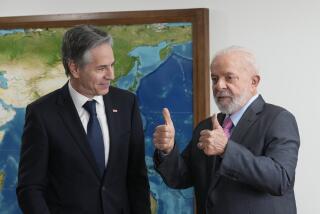Brazil Seeking Delay in Payments to IMF
- Share via
WASHINGTON — Brazil is asking a delay in its payments to the International Monetary Fund, something the fund--owned by 151 governments--has never permitted in its history of more than 40 years, an official familiar with its operations said Thursday.
“The fund has nothing in its mechanisms to provide for a delay,” said the source, who spoke on condition that he not be further identified.
Fund officials, following their usual practice, declined to offer any public comment on the request.
The United States is the biggest contributor to the fund but does not have a controlling interest. The managing director is a Frenchman, Marcel Camdessus.
It was created originally to keep currencies stable among all its member governments, rich and poor. In recent years it has devoted nearly all its effort to packaging loans for poor countries, in return for promises from their governments to change their economic policies so that they would be in better shape to repay.
Payments of interest and principal owed to the fund are traditionally a priority for debtor governments--they have been more willing to make governments and private creditors wait for their money. The fund has traditionally followed a strict policy of refusing new talks with governments that fall too far behind in their payments.
Finance Minister Luiz Carlos Bresser Pereira of Brazil was quoted as saying on Tuesday that he hoped the fund would suspend the payment of what Brazil owes in the second half of this year. Brazil has been paying the fund about $1.1 billion a year in principal and interest.
Brazil’s debt to the fund comes to about $4.75 billion, out of a total debt of $108 billion, the largest in the Third World. Poor countries’ debts now total about $1.085 trillion, and several countries have limited or halted their payments. The Ivory Coast is the most recent, following Peru, Ecuador, Sudan and others.
They complain that protectionist policies and a slow-down of growth in the United States and other wealthier countries prevent them from earning enough money for their needs. In addition to keeping up with their debts, they need hard currency for imports.
More to Read
Sign up for Essential California
The most important California stories and recommendations in your inbox every morning.
You may occasionally receive promotional content from the Los Angeles Times.












